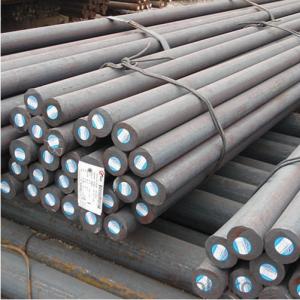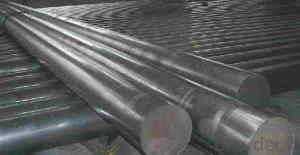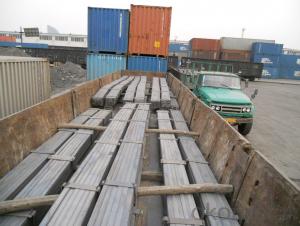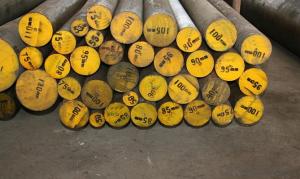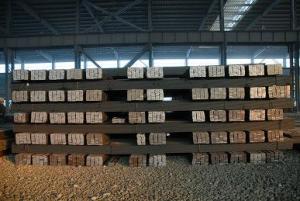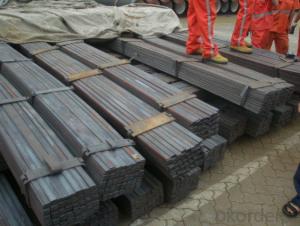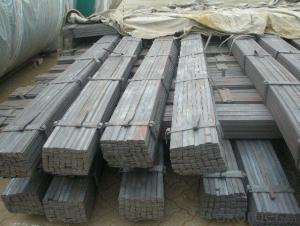Grade AISI6150 CNBM Hot Rolled Spring Steel bar
- Loading Port:
- Shanghai
- Payment Terms:
- TT or LC
- Min Order Qty:
- 25 m.t.
- Supply Capability:
- 10000 m.t./month
OKorder Service Pledge
OKorder Financial Service
You Might Also Like
Specification
Specifications of Steel Round Rod Bar:
1. Produce Standard: GB, AISI, ASTM, SAE, EN, BS, DIN, JIS
2. Produce processes: Smelt Iron -EAF smelt Billet - ESR smelt Billet -Hot rolled or forged get the steel round bar and plate
3. Heat treatment: Normalized / Annealed / Quenched+Tempered
Available Specification | |||
Round Bar | Diameter (mm) |
| Length (mm) |
5-1500 |
| 2000-5800 | |
Plate | Thickness (mm) | With (mm) | Length (mm) |
20-1000 | 200-1500 | 2000-5800 | |
The specification can be customised | |||
Chemical Composition:
Grade | C | Si | Mn | P | S | Cr | Ni | V |
AISI 6150 | 0.48-0.53 | 0.15-0.35 | 0.70-0.90 | ≤0.035 | ≤0.050 | 0.80-1.10 | — | ≥0.15 |
DIN 51CrV4 | 0.47-0.55 | ≤0.40 | 0.70-1.10 | ≤0.035 | ≤0.035 | 0.90-1.20 | — | 0.10-0.25 |
BG 50CrV | 0.46-0.54 | 0.17-0.37 | 0.50-0.80 | ≤0.030 | ≤0.030 | 0.80-1.10 | ≤0.035 | 0.10-0.20 |
Usage and Applications:
Advanced spring steel , used for important spring with a large cross-section and high load,and the valve spring, piston, spring, the relief valve spring with working temperature below 300 ℃ .
Packaging & Delivery:
Packaging Detail: Standard seaworthy packing or as customer required; all goods are packed in bundle with steel strips and shipped by break bulk vessel or container
Delivery Detail: 45 days
Production Flow:
EAF+LF+VD+ Forged+ Heat Treatment
Material prepare (billet) — heat up — rough rolling — precision rolling — cooling — packing — storage and transportation
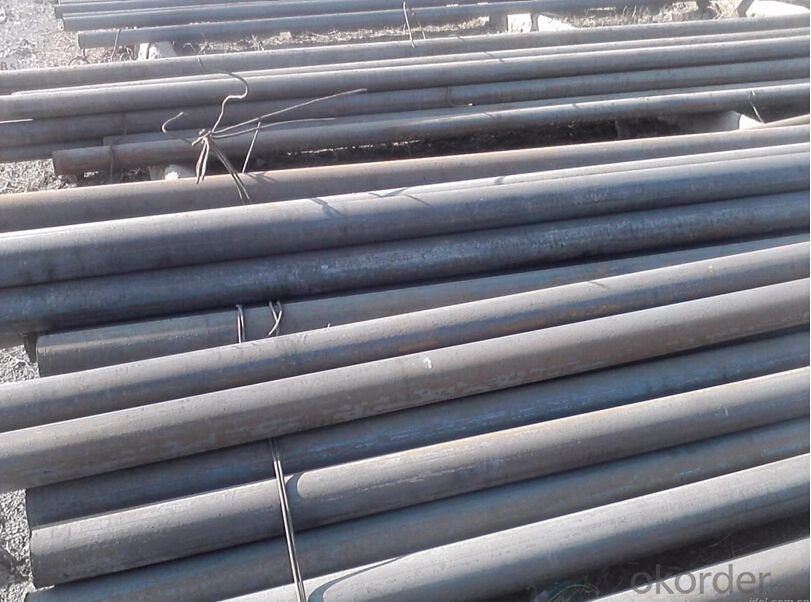
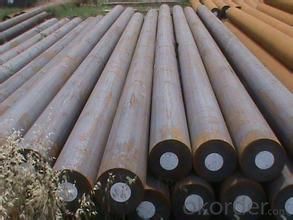
Quality Assurance:
1. We will strictly inspect our production that we sold according to the customer’s request.
2. Our steel reaches international quality standards.
3. Quality should be in conformity with the specification of the manufacturer. Quantity and packing conditions should be in conformity with the term in the contract.
4. Should the packing found damaged, the buyer has the right to claim to the seller
- Q: What are the different welding techniques used for special steel?
- Some of the different welding techniques used for special steel include TIG (Tungsten Inert Gas) welding, MIG (Metal Inert Gas) welding, and submerged arc welding. TIG welding is commonly used for stainless steel and allows for precise control and high-quality welds. MIG welding is versatile and can be used for a wide range of steel types, including special steel, providing fast and efficient welds. Submerged arc welding is used for thicker sections of special steel and offers excellent penetration and deposition rates.
- Q: What are the requirements for special steel used in renewable energy equipment manufacturing?
- The requirements for special steel used in renewable energy equipment manufacturing include high strength and durability, corrosion resistance, and the ability to withstand extreme temperatures and environmental conditions. Additionally, the steel should possess good weldability and formability to facilitate the manufacturing process. It is also important for the steel to have low carbon content to reduce its environmental impact and improve sustainability.
- Q: What are the different heat-resistant grades of special steel?
- There are several heat-resistant grades of special steel that are specifically designed to withstand high temperatures and thermal stress. Some of the commonly used heat-resistant grades include: 1. Stainless Steel 310: This grade of stainless steel is known for its excellent resistance to high temperatures, oxidation, and corrosion. It can withstand temperatures up to 1100°C (2012°F) and is often used in furnace parts, heat treatment baskets, and other heat-intensive applications. 2. Inconel 600: Inconel 600 is a nickel-chromium alloy that offers exceptional resistance to high temperatures and oxidation. It can operate effectively in temperatures ranging from cryogenic to 1093°C (2000°F) and is widely used in gas turbines, heat exchangers, and other high-temperature environments. 3. Hastelloy C-276: Hastelloy C-276 is a nickel-molybdenum-chromium alloy that offers excellent resistance to a wide range of corrosive environments and high temperatures. It can withstand temperatures up to 1093°C (2000°F) and is commonly used in chemical processing, power generation, and pollution control applications. 4. Titanium Grade 2: Titanium Grade 2 is a commercially pure titanium alloy that exhibits good resistance to high temperatures and corrosion. It can operate effectively in temperatures up to 538°C (1000°F) and is often used in heat exchangers, chemical processing equipment, and marine applications. 5. Alloy 617: Alloy 617 is a nickel-chromium-cobalt-molybdenum alloy that offers exceptional strength and resistance to high-temperature environments. It can withstand temperatures up to 1204°C (2200°F) and is commonly used in gas turbines, petrochemical plants, and other heat-intensive industries. These are just a few examples of the heat-resistant grades of special steel available in the market. The selection of the appropriate grade depends on the specific temperature requirements, corrosion resistance, and mechanical properties needed for the application.
- Q: What are the specific requirements for special steel used in the food processing industry?
- The specific requirements for special steel used in the food processing industry include being resistant to corrosion, easy to clean and sanitize, non-reactive with food products, and compliant with food safety regulations. It should also have high strength and durability to withstand heavy usage and frequent cleaning.
- Q: What are the common challenges in welding special steel?
- When welding special steel, there are several challenges that differ from welding regular carbon steel. Some common challenges in welding special steel include the following: 1. High carbon content: Special steels often have a high carbon content, which can increase hardness and brittleness. Achieving a proper weld without cracks or defects can be more difficult. 2. High alloy content: Special steels often contain various alloying elements like chromium, nickel, or molybdenum, which can affect weldability. These elements can introduce complexities, such as increased susceptibility to heat-affected zone (HAZ) cracking or the formation of brittle phases. 3. Heat sensitivity: Special steels are often more sensitive to heat during welding. Excessive heat can cause grain growth, reduced mechanical properties, or distortion of the welded structure. Therefore, careful control of heat input and preheating techniques may be necessary. 4. Pre-weld and post-weld treatments: Specific pre-weld and post-weld treatments may be required for special steels to ensure proper weld quality and performance. These treatments can include preheating, stress relieving, or post-weld heat treatment. Failure to follow these procedures can result in residual stresses or reduced mechanical properties. 5. Joint design and fit-up: The design and fit-up of the weld joint can also present challenges. Special steels may require specific joint configurations, such as a double-V or double-U groove, to ensure adequate penetration and fusion. Additionally, tight tolerances may be necessary to maintain desired mechanical properties. 6. Welding process selection: The choice of welding process can greatly impact the success of welding special steel. TIG or laser welding may be more suitable for high-alloy steels, while MIG or submerged arc welding may be better for specific applications. Selecting the appropriate welding process is crucial for achieving a sound weld with desired properties. To overcome these challenges, it is essential to thoroughly understand the specific type of special steel being welded and follow proper welding procedures and techniques. This may involve conducting pre-weld qualification tests, using suitable welding consumables, and ensuring proper heat control throughout the welding process. Additionally, working with experienced welders and seeking guidance from experts in special steel welding can effectively overcome these challenges.
- Q: What are the different methods of surface protection for special steel?
- Different methods of surface protection for special steel offer unique benefits and are suitable for specific applications. Some commonly used methods are: 1. Galvanization: Zinc coating is applied to the steel, providing excellent corrosion resistance. Hot-dip galvanization or electroplating can be used depending on the requirements. 2. Paint coating: A paint coating is applied to protect the steel from corrosion and environmental factors. The paint acts as a barrier, preventing rust and damage. 3. Powder coating: Dry powder is applied to the steel surface and heated to create a protective layer. This method offers excellent resistance to corrosion, chemicals, and abrasion, making it ideal for harsh conditions. 4. Electroplating: A layer of metal is deposited onto the steel surface through an electrochemical process. This enhances corrosion resistance and may provide additional benefits such as increased hardness or improved aesthetics. 5. Thermal spraying: Material like zinc or aluminum is melted or heated and sprayed onto the steel surface to form a protective coating. Thermal spraying offers excellent corrosion protection and can be used for surface repairs. 6. Ceramic coating: Ceramic coatings are highly resistant to corrosion, abrasion, and high temperatures. They are commonly used in extreme conditions such as the aerospace or automotive industries. 7. Passivation: Chemical process removes free iron and contaminants from the surface of stainless steel. This improves corrosion resistance by forming a passive oxide layer. Choosing the appropriate surface protection method depends on the specific requirements of the steel and its application. Factors such as desired corrosion resistance level, environmental conditions, and desired lifespan should be considered when selecting a method.
- Q: What are the challenges in recycling special steel?
- Special steel recycling presents several obstacles due to its unique composition and properties. To begin with, special steel often contains various alloying elements, which enhance its strength, durability, and resistance to corrosion. These alloys can complicate and add complexity to the recycling process when compared to recycling ordinary steel. A key challenge is the separation of special steel from other metals during recycling. Special steel may contain valuable and rare elements like nickel, chromium, and molybdenum, which are crucial for its distinct properties. Extracting these elements from other metals demands advanced techniques and specialized equipment, thereby increasing the intricacy and cost of recycling. Another hurdle arises from the presence of impurities in special steel. These impurities can enter during manufacturing or through contamination during use. Eliminating these impurities is essential to ensure that the recycled steel meets the required specifications for its intended applications. However, the high melting point and purification resistance of some impurities can complicate the recycling process. Moreover, the physical characteristics of special steel, such as its high hardness and toughness, make it challenging to handle and process during recycling. Special steel often necessitates energy-intensive methods like shredding or higher temperature melting, which in turn increases the overall cost and environmental impact of recycling. Furthermore, the economic feasibility of recycling special steel can be a challenge. Market demand for special steel can fluctuate, making it difficult for recyclers to maintain a consistent and profitable supply. Additionally, the costs associated with collecting, transporting, sorting, and processing special steel can be higher compared to ordinary steel, further impacting the economic viability of recycling. In conclusion, the difficulties in recycling special steel primarily arise from its intricate composition, the need for separation from other metals, the presence of impurities, the physical characteristics of the material, and the economic feasibility of the recycling process. To address these challenges, innovative technologies, efficient separation methods, and a sustainable market demand for recycled special steel are necessary.
- Q: How does special steel perform in chemical processing applications?
- Special steel is highly desirable in chemical processing applications due to its excellent corrosion resistance, high temperature resistance, and strength. These properties allow it to withstand harsh chemical environments and maintain its structural integrity, ensuring safe and efficient operation. Additionally, special steel can exhibit exceptional resistance to pitting, crevice corrosion, and stress corrosion cracking, making it an ideal choice for various chemical processing equipment such as reactors, storage tanks, and pipelines.
- Q: How does special steel perform in terms of machinability?
- Special steel typically performs well in terms of machinability. It is specially designed to have improved cutting, drilling, and shaping properties, making it easier to work with using various machining processes. Special steel often has a more consistent composition and structure, which results in reduced tool wear, better surface finish, and increased productivity during machining operations.
- Q: What is the cost of special steel compared to regular steel?
- The cost of special steel is generally higher compared to regular steel due to its higher quality, specific composition, and unique properties, which make it more suitable for specialized applications.
Send your message to us
Grade AISI6150 CNBM Hot Rolled Spring Steel bar
- Loading Port:
- Shanghai
- Payment Terms:
- TT or LC
- Min Order Qty:
- 25 m.t.
- Supply Capability:
- 10000 m.t./month
OKorder Service Pledge
OKorder Financial Service
Similar products
Hot products
Hot Searches
Related keywords





